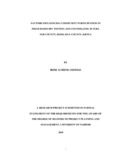| dc.contributor.author | Odongo, Irine Achieng | |
| dc.date.accessioned | 2018-10-18T12:53:54Z | |
| dc.date.available | 2018-10-18T12:53:54Z | |
| dc.date.issued | 2018 | |
| dc.identifier.citation | Master of Arts in Project Planning and Management, University of Nairobi | en_US |
| dc.identifier.uri | http://hdl.handle.net/11295/104195 | |
| dc.description.abstract | Community participation is vital in field based HIV testing and counseling all across the world. When a community is engaged fully in a health care program, there is harmony and success in the implementation. This is because the program is geared towards community development. However, this practice is always affected by hurdles which influence the community participation in the field HIV testing and counseling. This project is going to discuss factors influencing community participation in the field based HIV testing and counseling in Homa Bay County, Suba Sub County. The main objectives of this study include; how community perception influences participation in field based HIV testing and counseling. Community perception includes stigma, attitude and culture. Another objective will be socio-economic issues which will focus on are marital/relationship status religion and income levels. The third objective is how structural factors influences community participation where its main components focused on confidentiality, time taken during service provision and testing setting. The final objective is the mobilization factors where its main component will be source of information on field tests such as use of barazas, community health volunteers (door to door) and public address system. The study used a descriptive survey research design. The targeted number was 103,054 community members and 145 healthcare workers in Suba sub county, and used Krejcie and Morgan table to determine sample size of 457. Proportionate Stratified random sampling was employed using the administrative ward units as the strata to avoid biasness in the study. Data collection was conducted using questionnaires for the residents and interviews for the key health care workers to get the required information. The collected data was checked for completeness and analyzed using Statistical Package for Social Scientist (SPSS) technique version 21. The study found that community perception affected the level of respondents’ participation in field based HIV test and counseling. There is a negative correlation between social economic factors and the community participation in field based HIV tests and counseling.The structural factors have a positive significant influence on community participation in field based HIV tests and counseling.There is a positive correlation between mobilization strategies and the community participation in field based HIV tests and counseling. The study recommends an integrated approach to Field based HIV testing and counseling through additional health services in order to ensure maximum community participation. Health care workers should be encouraged to maintain privacy and confidentiality of clients. All the stakeholders involved in health should mobilize the community to participate in field HIV testing and Counseling. The researcher suggested that similar studies can be done in other sub counties with high HIV prevalence. It also suggests further studies on factors influencing uptake of HIV counseling and testing among fishermen in Kenya. | en_US |
| dc.language.iso | en | en_US |
| dc.publisher | University of Nairobi | en_US |
| dc.rights | Attribution-NonCommercial-NoDerivs 3.0 United States | * |
| dc.rights.uri | http://creativecommons.org/licenses/by-nc-nd/3.0/us/ | * |
| dc.title | Factors influencing community participation in field based HIV testing and counselling in Suba sub county, Homa Bay county, Kenya | en_US |
| dc.type | Thesis | en_US |



